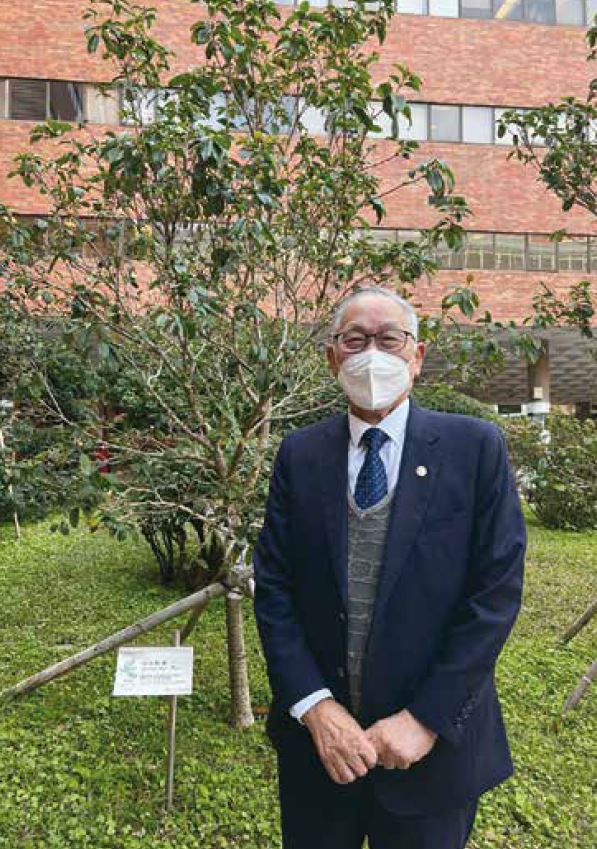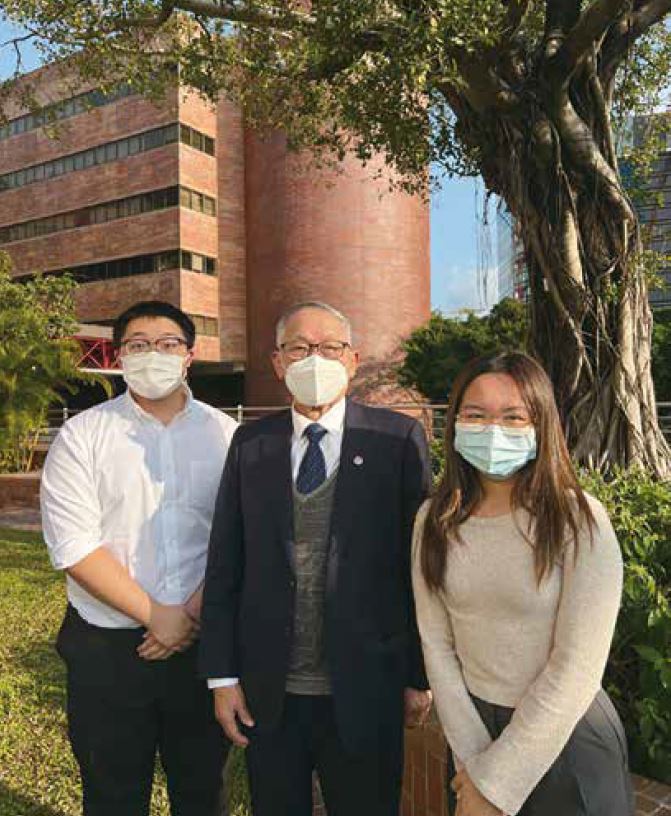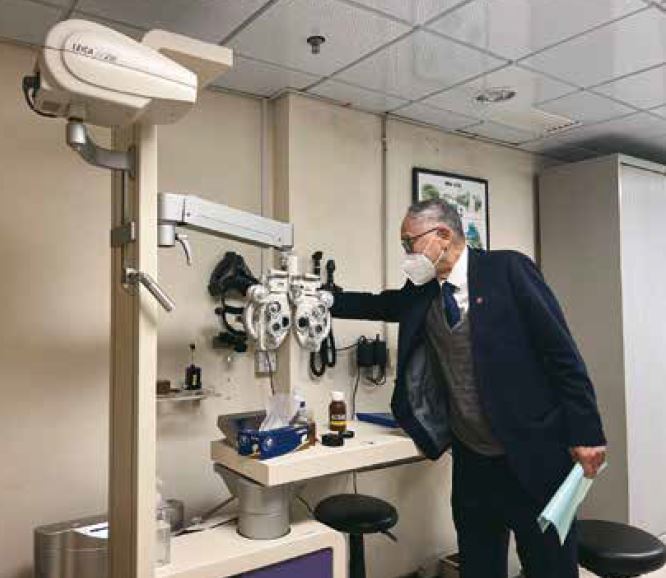© Hong Kong Academy of Medicine. CC BY-NC-ND 4.0
HEALTHCARE FOR SOCIETY
Trailblazing primary care for a healthier city: an interview with Professor George Woo
Henry Evan Cheng, Man-tsin Lo, Nathan So
Year 5, The Chinese University of Hong Kong, Hong Kong SAR, China
Professor George Woo, the ‘father of optometry’ in
Hong Kong, began his career by establishing the first
optometry programme in Hong Kong, and his tale
is a valuable lesson in commitment, perseverance,
and resourcefulness. In 1973, Prof Woo approached
The Hong Kong Polytechnic University (PolyU) with
the idea of setting up the first optometry school
in Hong Kong. After many years, it has evolved
from a certification course in 1978 into a five-year
degree programme, granting students the degree of
Bachelor of Science in Optometry.
One can attribute this evolution to Prof Woo’s
continued commitment to healthcare in Hong Kong.
His years of working with and nurturing the next
generation of clinicians are a compelling reminder
that healthcare professionals are leaders, servants,
and pillars of their communities.
Career
Prof Woo is humble about his contributions to the
Faculty of Health and Social Sciences at PolyU;
he recalls his happiness at seeing the first cohort
from the Professional Diploma in Optometry
graduate in 1987, witnessing the fruit of the faculty. He humourously recalls how he swore he would
retire after helping the faculty transition to a fleet
of Bachelor of Science programmes in different
disciplines; he laughs when he admits he did not
retire.
Prof Woo has been advocating for
improvements in the Hong Kong healthcare system
for the past 30 years, focusing on the limited
availability and scope of primary care. While he
acknowledges the government’s strides in improving
the availability of primary care within District
Health Centres, their narrow scope led to severe
underutilisation. He firmly believes in expanding
the District Health Centre’s purview to allow for
the provision of a more comprehensive range of
primary care services, such as traditional Chinese
medicine practitioners, full-time pharmacists,
optometrists, dentists, occupational therapists,
and physiotherapists. On-site holistic healthcare
can relieve the burden on primary care doctors,
improving the distribution of resources and
manpower. Better usage of all dimensions of primary
care can also enhance the professional-patient
relationship; rather than shuttling a patient between
various doctors and referrals, a single professional with the relevant expertise, and who could track
patient progress, would significantly improve the
primary healthcare experience.
Prof Woo laments that little change has
been achieved over the years due to rigid rules
and regulations, and despite him actively passing
17 items for legislation while serving on the
Supplementary Medical Professions Council for
10 years. He raised continuing medical education as
an example, where the lack of training for primary
care physicians overshadows Hong Kong’s robust
training for specialists. Other countries have been
pursuing continuing education for 60 to 70 years
but Hong Kong’s efforts have fallen behind. A
gleam of hope appeared in 2021, when compulsory
continuing education was required for optometrists.
However, due to the complexity of the healthcare
system, change in Hong Kong is hampered by
political and professional interests, as well as the
divide between the public and private sectors. With
the current trajectory, Prof Woo mournfully states
that he doubts meaningful change will come in his
lifetime.
Humanitarian work
In addition to being a leader in his field, Prof Woo
continues to be an avid hotline volunteer for the
Samaritans, which he has done for over 20 years.
The Samaritans is a non-profit organisation offering
a 24-hour multilingual hotline service run by
volunteers who provide emotional support to people
who are in distress or suicidal. Prof Woo realised
the importance of personal, human-to-human
interactions for one’s wellbeing early on; he recalls
how, as a student, he would volunteer to provide
health services at an elderly care home. At the time,
he noted that the older adults were less concerned
about their health complaints, but instead treasured
the chats and personal time spent with them. It was
then that he realised a caring, empathetic touch
was just as important to wellbeing as the scientific
aspect of healthcare. He was first inspired to join the
Samaritans when he understood that helping patients
was beyond just medicine and surgery. As he began
to identify the link between mental health and visual
problems, he knew it was his duty as a practitioner to
help patients to heal physically and mentally. Over the
years, Prof Woo felt a sense of gratitude towards the
hotline as it helped him gain a deeper understanding
of the complex issues regarding mental health in the
city. With over 2000 hours of volunteer work under
his belt, it broadened his horizons and helped him
empathise with and understand his patients better.
In 2015, Prof Woo became the chairman of the
Samaritans Board of Directors, where he expanded
their services beyond hotline help and lent support
by introducing many outreach programmes, such as the Supporting the Aged Responsibly Programme,
or STAR, aimed at improving the mental health of
the elderly population.
To this day, Prof Woo continues to don his
headset and answer phone calls for the hotline
with the hopes that providing a listening ear can
help people rise above difficult moments in their
lives. In 2020, Prof Woo was awarded the Hong
Kong Humanity Award, bestowed upon those who
exemplify the very spirit of humanity in service and
commitment to their community by putting it into
action and practice. ‘I will walk with them as long as
they want to walk further to improve their quality of
life,’ affirms Prof Woo, as he continues his mission of
curing wounds invisible to the eye. He hopes that as
he continues to serve in the future, more academics
and medical professionals will step out of their
comfort zones and volunteer to help.
Mission to nurture the next generation
Those who decide to bear the Hippocratic Oath
will find no shortage of mentors, especially Prof
Woo, who will shape them and provide them with
the skills, knowledge, and insight needed to one day
enter the field and serve the community.
Prof Woo continues to come to PolyU to
mentor students and perform research. Regarding
his students as blank sheets of paper, he believes
it is his duty both to shape the way that they see
the world and to teach them about the healthcare
system that they will one day work in and, hopefully,
transform for the better. His establishment of the
field of optometry is only the first step in what he
sees as a mission to improve Hong Kong’s healthcare
systems and prepare those who serve within it.




